The characters such as pointed elongated snout and strong and stout forelimbs, well developed claws are observed in _____ adaptation:
Arboreal
Aerial
Cursorial
Fossorial.
The correct Answer is:D
To solve the question regarding the adaptations characterized by a pointed elongated snout, strong and stout forelimbs, and well-developed claws, we can follow these steps:
1. Identify the Characteristics: The question provides specific characteristics: pointed elongated snout, strong and stout forelimbs, and well-developed claws.
2. Understand the Types of Adaptations: We need to categorize these characteristics into the types of adaptations:
- Arboreal: Adaptations for living in trees.
- Aerial: Adaptations for flying.
- Cursorial: Adaptations for running fast.
- Fossorial: Adaptations for digging and living underground.
3. Analyze the Characteristics:
- A pointed elongated snout is often useful for animals that need to burrow or dig into the ground.
- Strong and stout forelimbs are essential for digging and moving soil.
- Well-developed claws are crucial for burrowing activities.
4. Match Characteristics to Adaptation: Based on the analysis:
- The pointed snout, stout forelimbs, and claws are indicative of fossorial adaptations, which are specifically designed for animals that dig and live underground.
5. Select the Correct Option: Therefore, the correct answer to the question is that these characteristics are observed in fossorial adaptation.
Final Answer:
The characters such as pointed elongated snout and strong and stout forelimbs, well-developed claws are observed in fossorial adaptation.
---
- Arboreal: Adaptations for living in trees.
- Aerial: Adaptations for flying.
- Cursorial: Adaptations for running fast.
- Fossorial: Adaptations for digging and living underground.
- A pointed elongated snout is often useful for animals that need to burrow or dig into the ground.
- Strong and stout forelimbs are essential for digging and moving soil.
- Well-developed claws are crucial for burrowing activities.
- The pointed snout, stout forelimbs, and claws are indicative of fossorial adaptations, which are specifically designed for animals that dig and live underground.
The characters such as pointed elongated snout and strong and stout forelimbs, well-developed claws are observed in fossorial adaptation.
Topper's Solved these Questions
- ORGANISMS AND THE ENVIRONMENTBOOK - DINESH PUBLICATION ENGLISHCHAPTER - ORGANISMS AND THE ENVIRONMENTEXERCISE - CYG
17 Videos
- ORGANISMS AND THE ENVIRONMENTBOOK - DINESH PUBLICATION ENGLISHCHAPTER - ORGANISMS AND THE ENVIRONMENTEXERCISE - CYG
17 Videos
- NO IDEABOOK - DINESH PUBLICATION ENGLISHCHAPTER - NO IDEAEXERCISE - Brain Teasers
37 Videos
- ORIGIN OF LIFE BOOK - DINESH PUBLICATION ENGLISHCHAPTER - ORIGIN OF LIFE EXERCISE - All Questions
201 Videos
Similar Questions
In the figure there is a long horizontal bridge over a river 75 m high from water surface. A strong man throws a stone in the parallel plane of the bridge. A observer in a car travelling on the bridge finds the stone going pass by the car while ascending and also while descending between two points on the road 30 m away. The car is travelling at a speed of 15 m/s. The stone is thrown from the bank of river just at the same level of water.
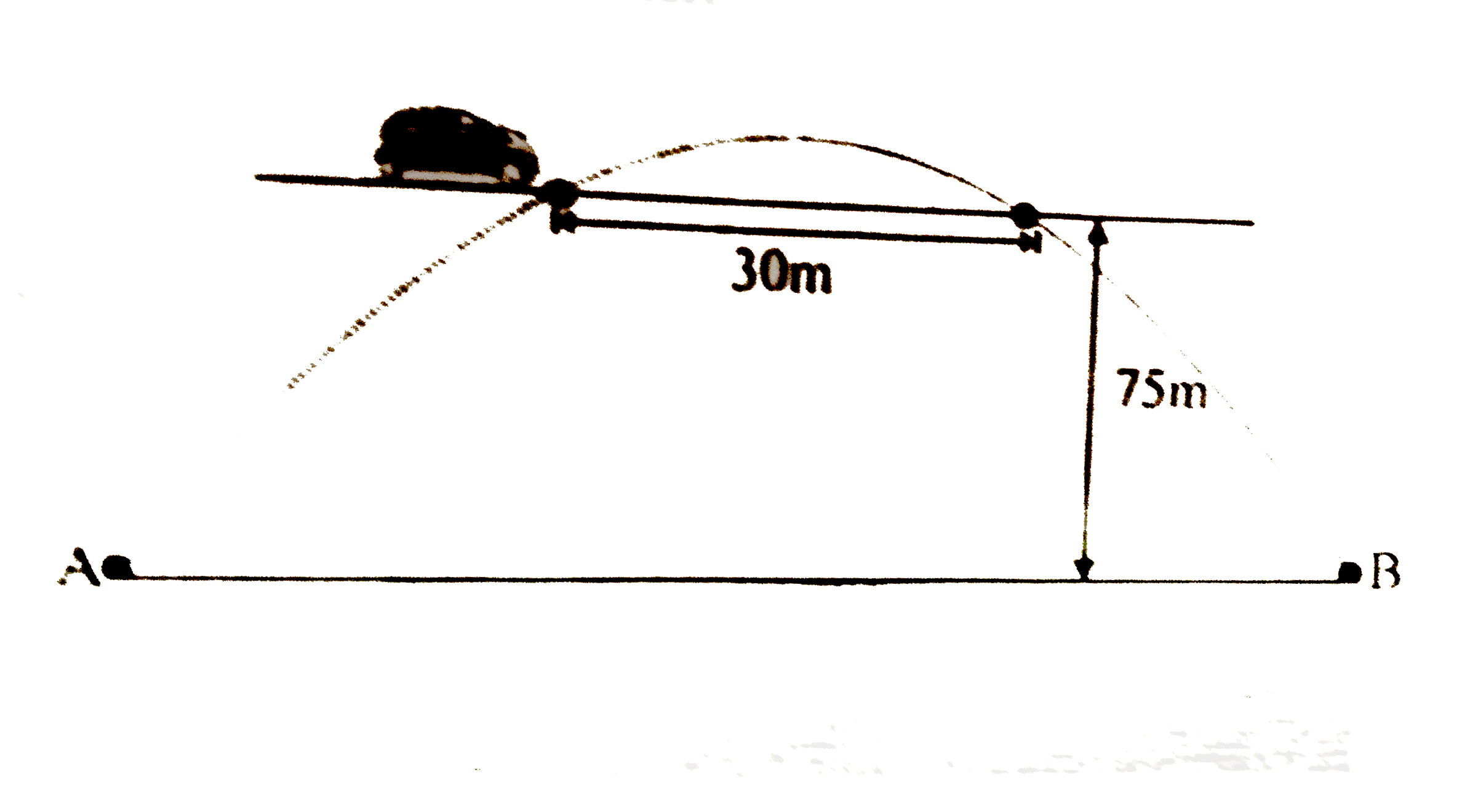
What is the angle the velocity makes with the bridge when it goes past the car while ascending ?
View SolutionThis passage is adapted from Iain King, “Can Economics Be Ethical?” ©2013 by Prospect Publishing.
Recent debates about the economy have rediscovered the question, “is that right?”, where “right” means more than just profits or efficiency.
Some argue that because the free markets allow for personal choice, they are already ethical. Others have accepted the ethical critique and embraced corporate social responsibility. But before we can label any market outcome as “immoral,” or sneer at economists who try to put a price on being ethical, we need to be clear on what we are talking about.
There are different views on where ethics should apply when someone makes an economic decision. Consider Adam Smith, widely regarded as the founder of modern economics. He was a moral philosopher who believed sympathy for others was the basis for ethics (we would call it empathy nowadays). But one of his key insights in The Wealth of Nations was that acting on this empathy could be counter-productive—he observed people becoming better off when they put their own empathy aside, and interacted in a self-interested way. Smith justifies selfish behavior by the outcome. Whenever planners use cost-benefit analysis to justify a new railway line, or someone retrains to boost his or her earning power, or a shopper buys one to get one free, they are using the same approach: empathizing with someone, and seeking an outcome that makes that person as well off as possible—although the person they are empathizing with may be themselves in the future.
Instead of judging consequences, Aristotle said ethics was about having the right character—displaying virtues like courage and honesty. It is a view put into practice whenever business leaders are chosen for their good character. But it is a hard philosophy to teach—just how much loyalty should you show to a manufacturer that keeps losing money? Show too little and you’re a “greed is good” corporate raider, too much and you’re wasting money on unproductive capital. Aristotle thought there was a golden mean between the two extremes, and finding it was a matter of fine judgment. But if ethics is about character, it’s not clear what those characteristics should be.
There is yet another approach: instead of rooting ethics in character or the consequences of actions, we can focus on our actions themselves. From this perspective some things are right, some wrong—we should buy fair trade goods, we shouldn’t tell lies in advertisements. Ethics becomes a list of commandments, a catalog of “dos” and “don’ts.”
When a finance official refuses to devalue a currency because they have promised not to, they are defining ethics this way. According to this approach devaluation can still be bad, even if it would make everybody better off.
Many moral dilemmas arise when these three versions pull in different directions but clashes are not inevitable. Take fair trade coffee (coffee that is sold with a certification that indicates the farmers and workers who produced it were paid a fair wage), for example: buying it might have good consequences, be virtuous, and also be the right way to act in a flawed market. Common ground like this suggests that, even without agreement on where ethics applies, ethical economics is still possible.
Whenever we feel queasy about “perfect” competitive markets, the problem is often rooted in a phony conception of people. The model of man on which classical economics is based—an entirely rational and selfish being—is a parody, as John Stuart Mill, the philosopher who pioneered the model, accepted. Most people—even economists— now accept that this “economic man” is a fiction. We behave like a herd, we fear losses more than we hope for gains, rarely can our brains process all the relevant facts.
These human quirks mean we can never make purely “rational” decisions. A new wave of behavioral economists, aided by neuroscientists, is trying to understand our psychology, both alone and in groups, so they can anticipate our decisions in the marketplace more accurately. But psychology can also help us understand why we react in disgust at economic injustice, or accept a moral law as universal. Which means that the relatively new science of human behavior might also define ethics for us. Ethical economics would then emerge from one of the least likely places: economists themselves.
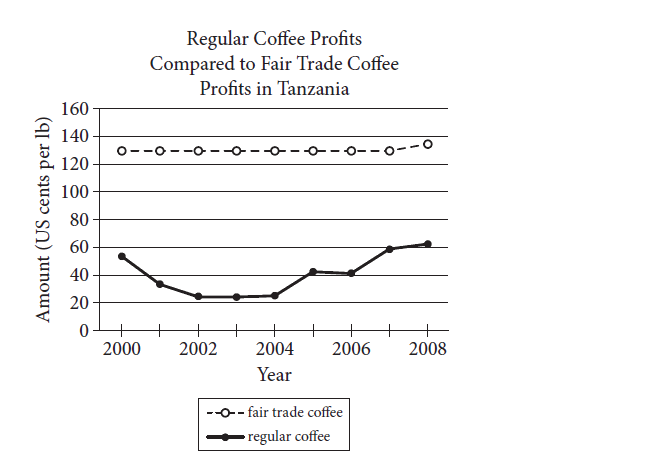
Adapted from the Fair Trade Vancouver website.
Data in the graph about per-pound coffee profits in Tanzania most strongly support which of the following statements?
View Solution
Knowledge Check
Fragrant flowers with well developed nectaries are an adaptation for
AhydrophilyBanemophilyCentomophilyDnone of theseConsider the following statements.
(i)In Gynandropsis, Passiflora , etc., thalamus is elongated and shows well developed nodes and internodes.
(ii)The floral buds in Agave, Allium , etc. , may sometimes get modified into vegetative buds or bulbils.
(iii)Sepals are concerned with protection of flowers in bud condition and petals help to attract insects for pollination.
(iv)Stamens and carpels serve as the male and female reproductive organs respectively.
Which of the following combinations of above statements provides an evidence that flower is a modified shoot ?A(i) and (ii)B(ii) and (iii)C(iii) and (iv)D(i) and (iv)This passage is adapted from Iain King, “Can Economics Be Ethical?” ©2013 by Prospect Publishing.
Recent debates about the economy have rediscovered the question, “is that right?”, where “right” means more than just profits or efficiency.
Some argue that because the free markets allow for personal choice, they are already ethical. Others have accepted the ethical critique and embraced corporate social responsibility. But before we can label any market outcome as “immoral,” or sneer at economists who try to put a price on being ethical, we need to be clear on what we are talking about.
There are different views on where ethics should apply when someone makes an economic decision. Consider Adam Smith, widely regarded as the founder of modern economics. He was a moral philosopher who believed sympathy for others was the basis for ethics (we would call it empathy nowadays). But one of his key insights in The Wealth of Nations was that acting on this empathy could be counter-productive—he observed people becoming better off when they put their own empathy aside, and interacted in a self-interested way. Smith justifies selfish behavior by the outcome. Whenever planners use cost-benefit analysis to justify a new railway line, or someone retrains to boost his or her earning power, or a shopper buys one to get one free, they are using the same approach: empathizing with someone, and seeking an outcome that makes that person as well off as possible—although the person they are empathizing with may be themselves in the future.
Instead of judging consequences, Aristotle said ethics was about having the right character—displaying virtues like courage and honesty. It is a view put into practice whenever business leaders are chosen for their good character. But it is a hard philosophy to teach—just how much loyalty should you show to a manufacturer that keeps losing money? Show too little and you’re a “greed is good” corporate raider, too much and you’re wasting money on unproductive capital. Aristotle thought there was a golden mean between the two extremes, and finding it was a matter of fine judgment. But if ethics is about character, it’s not clear what those characteristics should be.
There is yet another approach: instead of rooting ethics in character or the consequences of actions, we can focus on our actions themselves. From this perspective some things are right, some wrong—we should buy fair trade goods, we shouldn’t tell lies in advertisements. Ethics becomes a list of commandments, a catalog of “dos” and “don’ts.”
When a finance official refuses to devalue a currency because they have promised not to, they are defining ethics this way. According to this approach devaluation can still be bad, even if it would make everybody better off.
Many moral dilemmas arise when these three versions pull in different directions but clashes are not inevitable. Take fair trade coffee (coffee that is sold with a certification that indicates the farmers and workers who produced it were paid a fair wage), for example: buying it might have good consequences, be virtuous, and also be the right way to act in a flawed market. Common ground like this suggests that, even without agreement on where ethics applies, ethical economics is still possible.
Whenever we feel queasy about “perfect” competitive markets, the problem is often rooted in a phony conception of people. The model of man on which classical economics is based—an entirely rational and selfish being—is a parody, as John Stuart Mill, the philosopher who pioneered the model, accepted. Most people—even economists— now accept that this “economic man” is a fiction. We behave like a herd, we fear losses more than we hope for gains, rarely can our brains process all the relevant facts.
These human quirks mean we can never make purely “rational” decisions. A new wave of behavioral economists, aided by neuroscientists, is trying to understand our psychology, both alone and in groups, so they can anticipate our decisions in the marketplace more accurately. But psychology can also help us understand why we react in disgust at economic injustice, or accept a moral law as universal. Which means that the relatively new science of human behavior might also define ethics for us. Ethical economics would then emerge from one of the least likely places: economists themselves.
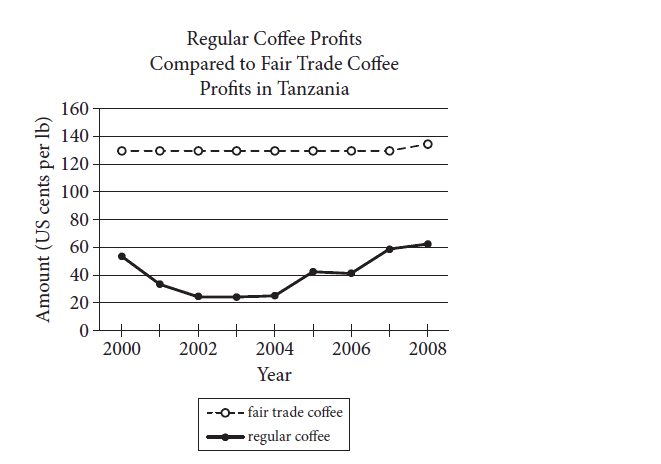
Adapted from the Fair Trade Vancouver website.
In the passage, the author anticipates which of the following objections to criticizing the ethics of freemarkets?ASmith’s association of free markets with ethical behavior still applies today.BFree markets are the best way to generate high profits, so ethics are a secondary consideration.CFree markets are ethical because they are made possible by devalued currency.DFree markets are ethical because they enable individuals to make choices.
This passage is adapted from Iain King, “Can Economics Be Ethical?” ©2013 by Prospect Publishing.
Recent debates about the economy have rediscovered the question, “is that right?”, where “right” means more than just profits or efficiency.
Some argue that because the free markets allow for personal choice, they are already ethical. Others have accepted the ethical critique and embraced corporate social responsibility. But before we can label any market outcome as “immoral,” or sneer at economists who try to put a price on being ethical, we need to be clear on what we are talking about.
There are different views on where ethics should apply when someone makes an economic decision. Consider Adam Smith, widely regarded as the founder of modern economics. He was a moral philosopher who believed sympathy for others was the basis for ethics (we would call it empathy nowadays). But one of his key insights in The Wealth of Nations was that acting on this empathy could be counter-productive—he observed people becoming better off when they put their own empathy aside, and interacted in a self-interested way. Smith justifies selfish behavior by the outcome. Whenever planners use cost-benefit analysis to justify a new railway line, or someone retrains to boost his or her earning power, or a shopper buys one to get one free, they are using the same approach: empathizing with someone, and seeking an outcome that makes that person as well off as possible—although the person they are empathizing with may be themselves in the future.
Instead of judging consequences, Aristotle said ethics was about having the right character—displaying virtues like courage and honesty. It is a view put into practice whenever business leaders are chosen for their good character. But it is a hard philosophy to teach—just how much loyalty should you show to a manufacturer that keeps losing money? Show too little and you’re a “greed is good” corporate raider, too much and you’re wasting money on unproductive capital. Aristotle thought there was a golden mean between the two extremes, and finding it was a matter of fine judgment. But if ethics is about character, it’s not clear what those characteristics should be.
There is yet another approach: instead of rooting ethics in character or the consequences of actions, we can focus on our actions themselves. From this perspective some things are right, some wrong—we should buy fair trade goods, we shouldn’t tell lies in advertisements. Ethics becomes a list of commandments, a catalog of “dos” and “don’ts.”
When a finance official refuses to devalue a currency because they have promised not to, they are defining ethics this way. According to this approach devaluation can still be bad, even if it would make everybody better off.
Many moral dilemmas arise when these three versions pull in different directions but clashes are not inevitable. Take fair trade coffee (coffee that is sold with a certification that indicates the farmers and workers who produced it were paid a fair wage), for example: buying it might have good consequences, be virtuous, and also be the right way to act in a flawed market. Common ground like this suggests that, even without agreement on where ethics applies, ethical economics is still possible.
Whenever we feel queasy about “perfect” competitive markets, the problem is often rooted in a phony conception of people. The model of man on which classical economics is based—an entirely rational and selfish being—is a parody, as John Stuart Mill, the philosopher who pioneered the model, accepted. Most people—even economists— now accept that this “economic man” is a fiction. We behave like a herd, we fear losses more than we hope for gains, rarely can our brains process all the relevant facts.
These human quirks mean we can never make purely “rational” decisions. A new wave of behavioral economists, aided by neuroscientists, is trying to understand our psychology, both alone and in groups, so they can anticipate our decisions in the marketplace more accurately. But psychology can also help us understand why we react in disgust at economic injustice, or accept a moral law as universal. Which means that the relatively new science of human behavior might also define ethics for us. Ethical economics would then emerge from one of the least likely places: economists themselves.
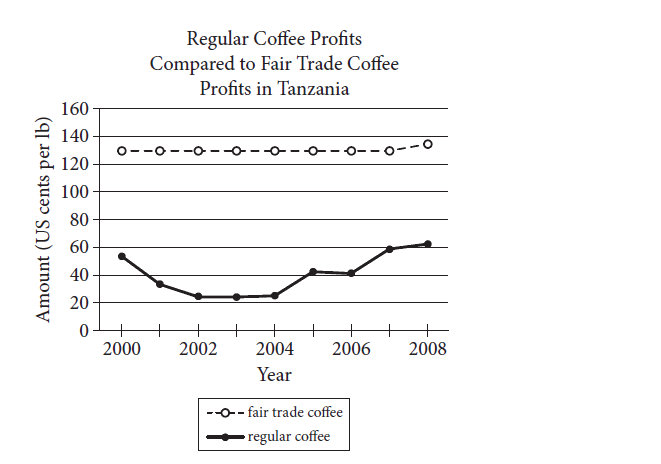
Adapted from the Fair Trade Vancouver website.
As used in line 6, “embraced” most nearly means
View SolutionThis passage is adapted from Iain King, “Can Economics Be Ethical?” ©2013 by Prospect Publishing.
Recent debates about the economy have rediscovered the question, “is that right?”, where “right” means more than just profits or efficiency.
Some argue that because the free markets allow for personal choice, they are already ethical. Others have accepted the ethical critique and embraced corporate social responsibility. But before we can label any market outcome as “immoral,” or sneer at economists who try to put a price on being ethical, we need to be clear on what we are talking about.
There are different views on where ethics should apply when someone makes an economic decision. Consider Adam Smith, widely regarded as the founder of modern economics. He was a moral philosopher who believed sympathy for others was the basis for ethics (we would call it empathy nowadays). But one of his key insights in The Wealth of Nations was that acting on this empathy could be counter-productive—he observed people becoming better off when they put their own empathy aside, and interacted in a self-interested way. Smith justifies selfish behavior by the outcome. Whenever planners use cost-benefit analysis to justify a new railway line, or someone retrains to boost his or her earning power, or a shopper buys one to get one free, they are using the same approach: empathizing with someone, and seeking an outcome that makes that person as well off as possible—although the person they are empathizing with may be themselves in the future.
Instead of judging consequences, Aristotle said ethics was about having the right character—displaying virtues like courage and honesty. It is a view put into practice whenever business leaders are chosen for their good character. But it is a hard philosophy to teach—just how much loyalty should you show to a manufacturer that keeps losing money? Show too little and you’re a “greed is good” corporate raider, too much and you’re wasting money on unproductive capital. Aristotle thought there was a golden mean between the two extremes, and finding it was a matter of fine judgment. But if ethics is about character, it’s not clear what those characteristics should be.
There is yet another approach: instead of rooting ethics in character or the consequences of actions, we can focus on our actions themselves. From this perspective some things are right, some wrong—we should buy fair trade goods, we shouldn’t tell lies in advertisements. Ethics becomes a list of commandments, a catalog of “dos” and “don’ts.”
When a finance official refuses to devalue a currency because they have promised not to, they are defining ethics this way. According to this approach devaluation can still be bad, even if it would make everybody better off.
Many moral dilemmas arise when these three versions pull in different directions but clashes are not inevitable. Take fair trade coffee (coffee that is sold with a certification that indicates the farmers and workers who produced it were paid a fair wage), for example: buying it might have good consequences, be virtuous, and also be the right way to act in a flawed market. Common ground like this suggests that, even without agreement on where ethics applies, ethical economics is still possible.
Whenever we feel queasy about “perfect” competitive markets, the problem is often rooted in a phony conception of people. The model of man on which classical economics is based—an entirely rational and selfish being—is a parody, as John Stuart Mill, the philosopher who pioneered the model, accepted. Most people—even economists— now accept that this “economic man” is a fiction. We behave like a herd, we fear losses more than we hope for gains, rarely can our brains process all the relevant facts.
These human quirks mean we can never make purely “rational” decisions. A new wave of behavioral economists, aided by neuroscientists, is trying to understand our psychology, both alone and in groups, so they can anticipate our decisions in the marketplace more accurately. But psychology can also help us understand why we react in disgust at economic injustice, or accept a moral law as universal. Which means that the relatively new science of human behavior might also define ethics for us. Ethical economics would then emerge from one of the least likely places: economists themselves.
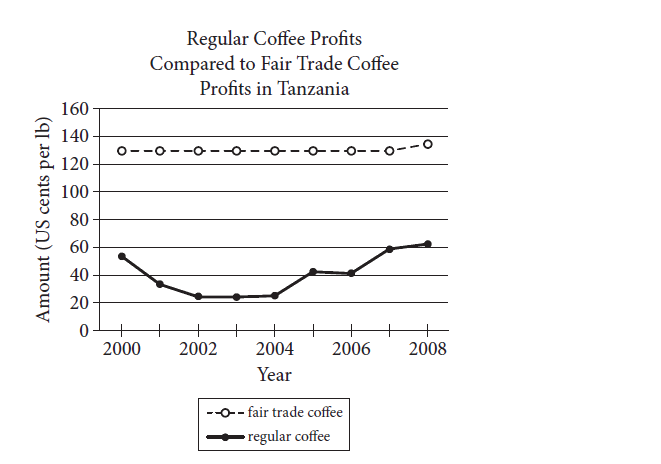
Adapted from the Fair Trade Vancouver website.
The main purpose of the passage is to
View SolutionThis passage is adapted from Iain King, “Can Economics Be Ethical?” ©2013 by Prospect Publishing.
Recent debates about the economy have rediscovered the question, “is that right?”, where “right” means more than just profits or efficiency.
Some argue that because the free markets allow for personal choice, they are already ethical. Others have accepted the ethical critique and embraced corporate social responsibility. But before we can label any market outcome as “immoral,” or sneer at economists who try to put a price on being ethical, we need to be clear on what we are talking about.
There are different views on where ethics should apply when someone makes an economic decision. Consider Adam Smith, widely regarded as the founder of modern economics. He was a moral philosopher who believed sympathy for others was the basis for ethics (we would call it empathy nowadays). But one of his key insights in The Wealth of Nations was that acting on this empathy could be counter-productive—he observed people becoming better off when they put their own empathy aside, and interacted in a self-interested way. Smith justifies selfish behavior by the outcome. Whenever planners use cost-benefit analysis to justify a new railway line, or someone retrains to boost his or her earning power, or a shopper buys one to get one free, they are using the same approach: empathizing with someone, and seeking an outcome that makes that person as well off as possible—although the person they are empathizing with may be themselves in the future.
Instead of judging consequences, Aristotle said ethics was about having the right character—displaying virtues like courage and honesty. It is a view put into practice whenever business leaders are chosen for their good character. But it is a hard philosophy to teach—just how much loyalty should you show to a manufacturer that keeps losing money? Show too little and you’re a “greed is good” corporate raider, too much and you’re wasting money on unproductive capital. Aristotle thought there was a golden mean between the two extremes, and finding it was a matter of fine judgment. But if ethics is about character, it’s not clear what those characteristics should be.
There is yet another approach: instead of rooting ethics in character or the consequences of actions, we can focus on our actions themselves. From this perspective some things are right, some wrong—we should buy fair trade goods, we shouldn’t tell lies in advertisements. Ethics becomes a list of commandments, a catalog of “dos” and “don’ts.”
When a finance official refuses to devalue a currency because they have promised not to, they are defining ethics this way. According to this approach devaluation can still be bad, even if it would make everybody better off.
Many moral dilemmas arise when these three versions pull in different directions but clashes are not inevitable. Take fair trade coffee (coffee that is sold with a certification that indicates the farmers and workers who produced it were paid a fair wage), for example: buying it might have good consequences, be virtuous, and also be the right way to act in a flawed market. Common ground like this suggests that, even without agreement on where ethics applies, ethical economics is still possible.
Whenever we feel queasy about “perfect” competitive markets, the problem is often rooted in a phony conception of people. The model of man on which classical economics is based—an entirely rational and selfish being—is a parody, as John Stuart Mill, the philosopher who pioneered the model, accepted. Most people—even economists— now accept that this “economic man” is a fiction. We behave like a herd, we fear losses more than we hope for gains, rarely can our brains process all the relevant facts.
These human quirks mean we can never make purely “rational” decisions. A new wave of behavioral economists, aided by neuroscientists, is trying to understand our psychology, both alone and in groups, so they can anticipate our decisions in the marketplace more accurately. But psychology can also help us understand why we react in disgust at economic injustice, or accept a moral law as universal. Which means that the relatively new science of human behavior might also define ethics for us. Ethical economics would then emerge from one of the least likely places: economists themselves.
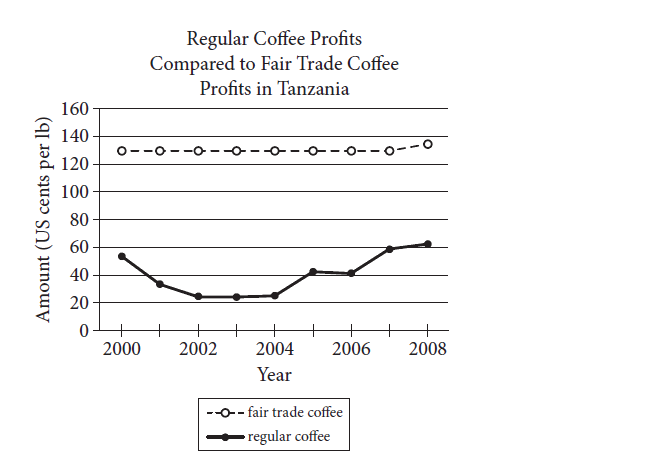
Adapted from the Fair Trade Vancouver website.
Which choice provides the best evidence for the answer to the previous question?
View SolutionThis passage is adapted from Iain King, “Can Economics Be Ethical?” ©2013 by Prospect Publishing.
Recent debates about the economy have rediscovered the question, “is that right?”, where “right” means more than just profits or efficiency.
Some argue that because the free markets allow for personal choice, they are already ethical. Others have accepted the ethical critique and embraced corporate social responsibility. But before we can label any market outcome as “immoral,” or sneer at economists who try to put a price on being ethical, we need to be clear on what we are talking about.
There are different views on where ethics should apply when someone makes an economic decision. Consider Adam Smith, widely regarded as the founder of modern economics. He was a moral philosopher who believed sympathy for others was the basis for ethics (we would call it empathy nowadays). But one of his key insights in The Wealth of Nations was that acting on this empathy could be counter-productive—he observed people becoming better off when they put their own empathy aside, and interacted in a self-interested way. Smith justifies selfish behavior by the outcome. Whenever planners use cost-benefit analysis to justify a new railway line, or someone retrains to boost his or her earning power, or a shopper buys one to get one free, they are using the same approach: empathizing with someone, and seeking an outcome that makes that person as well off as possible—although the person they are empathizing with may be themselves in the future.
Instead of judging consequences, Aristotle said ethics was about having the right character—displaying virtues like courage and honesty. It is a view put into practice whenever business leaders are chosen for their good character. But it is a hard philosophy to teach—just how much loyalty should you show to a manufacturer that keeps losing money? Show too little and you’re a “greed is good” corporate raider, too much and you’re wasting money on unproductive capital. Aristotle thought there was a golden mean between the two extremes, and finding it was a matter of fine judgment. But if ethics is about character, it’s not clear what those characteristics should be.
There is yet another approach: instead of rooting ethics in character or the consequences of actions, we can focus on our actions themselves. From this perspective some things are right, some wrong—we should buy fair trade goods, we shouldn’t tell lies in advertisements. Ethics becomes a list of commandments, a catalog of “dos” and “don’ts.”
When a finance official refuses to devalue a currency because they have promised not to, they are defining ethics this way. According to this approach devaluation can still be bad, even if it would make everybody better off.
Many moral dilemmas arise when these three versions pull in different directions but clashes are not inevitable. Take fair trade coffee (coffee that is sold with a certification that indicates the farmers and workers who produced it were paid a fair wage), for example: buying it might have good consequences, be virtuous, and also be the right way to act in a flawed market. Common ground like this suggests that, even without agreement on where ethics applies, ethical economics is still possible.
Whenever we feel queasy about “perfect” competitive markets, the problem is often rooted in a phony conception of people. The model of man on which classical economics is based—an entirely rational and selfish being—is a parody, as John Stuart Mill, the philosopher who pioneered the model, accepted. Most people—even economists— now accept that this “economic man” is a fiction. We behave like a herd, we fear losses more than we hope for gains, rarely can our brains process all the relevant facts.
These human quirks mean we can never make purely “rational” decisions. A new wave of behavioral economists, aided by neuroscientists, is trying to understand our psychology, both alone and in groups, so they can anticipate our decisions in the marketplace more accurately. But psychology can also help us understand why we react in disgust at economic injustice, or accept a moral law as universal. Which means that the relatively new science of human behavior might also define ethics for us. Ethical economics would then emerge from one of the least likely places: economists themselves.
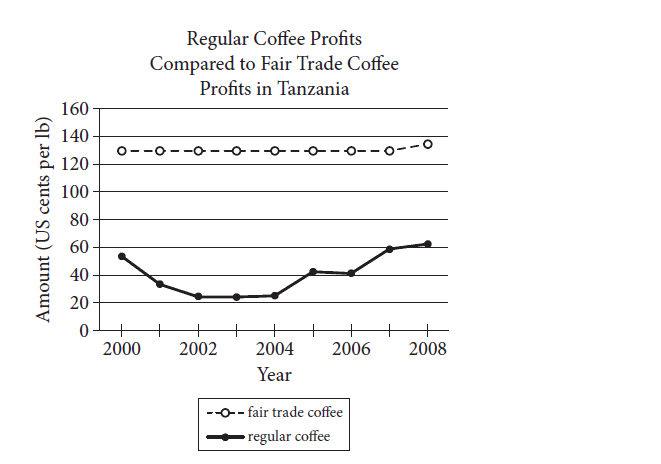
Adapted from the Fair Trade Vancouver website.
The main idea of the final paragraph is that
View SolutionThis passage is adapted from Iain King, “Can Economics Be Ethical?” ©2013 by Prospect Publishing.
Recent debates about the economy have rediscovered the question, “is that right?”, where “right” means more than just profits or efficiency.
Some argue that because the free markets allow for personal choice, they are already ethical. Others have accepted the ethical critique and embraced corporate social responsibility. But before we can label any market outcome as “immoral,” or sneer at economists who try to put a price on being ethical, we need to be clear on what we are talking about.
There are different views on where ethics should apply when someone makes an economic decision. Consider Adam Smith, widely regarded as the founder of modern economics. He was a moral philosopher who believed sympathy for others was the basis for ethics (we would call it empathy nowadays). But one of his key insights in The Wealth of Nations was that acting on this empathy could be counter-productive—he observed people becoming better off when they put their own empathy aside, and interacted in a self-interested way. Smith justifies selfish behavior by the outcome. Whenever planners use cost-benefit analysis to justify a new railway line, or someone retrains to boost his or her earning power, or a shopper buys one to get one free, they are using the same approach: empathizing with someone, and seeking an outcome that makes that person as well off as possible—although the person they are empathizing with may be themselves in the future.
Instead of judging consequences, Aristotle said ethics was about having the right character—displaying virtues like courage and honesty. It is a view put into practice whenever business leaders are chosen for their good character. But it is a hard philosophy to teach—just how much loyalty should you show to a manufacturer that keeps losing money? Show too little and you’re a “greed is good” corporate raider, too much and you’re wasting money on unproductive capital. Aristotle thought there was a golden mean between the two extremes, and finding it was a matter of fine judgment. But if ethics is about character, it’s not clear what those characteristics should be.
There is yet another approach: instead of rooting ethics in character or the consequences of actions, we can focus on our actions themselves. From this perspective some things are right, some wrong—we should buy fair trade goods, we shouldn’t tell lies in advertisements. Ethics becomes a list of commandments, a catalog of “dos” and “don’ts.”
When a finance official refuses to devalue a currency because they have promised not to, they are defining ethics this way. According to this approach devaluation can still be bad, even if it would make everybody better off.
Many moral dilemmas arise when these three versions pull in different directions but clashes are not inevitable. Take fair trade coffee (coffee that is sold with a certification that indicates the farmers and workers who produced it were paid a fair wage), for example: buying it might have good consequences, be virtuous, and also be the right way to act in a flawed market. Common ground like this suggests that, even without agreement on where ethics applies, ethical economics is still possible.
Whenever we feel queasy about “perfect” competitive markets, the problem is often rooted in a phony conception of people. The model of man on which classical economics is based—an entirely rational and selfish being—is a parody, as John Stuart Mill, the philosopher who pioneered the model, accepted. Most people—even economists— now accept that this “economic man” is a fiction. We behave like a herd, we fear losses more than we hope for gains, rarely can our brains process all the relevant facts.
These human quirks mean we can never make purely “rational” decisions. A new wave of behavioral economists, aided by neuroscientists, is trying to understand our psychology, both alone and in groups, so they can anticipate our decisions in the marketplace more accurately. But psychology can also help us understand why we react in disgust at economic injustice, or accept a moral law as universal. Which means that the relatively new science of human behavior might also define ethics for us. Ethical economics would then emerge from one of the least likely places: economists themselves.
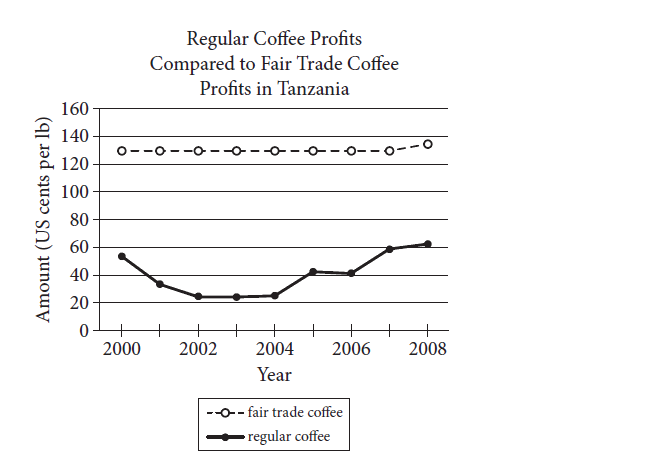
Adapted from the Fair Trade Vancouver website.
As used in line 58, “clashes” most nearly means
View Solution
